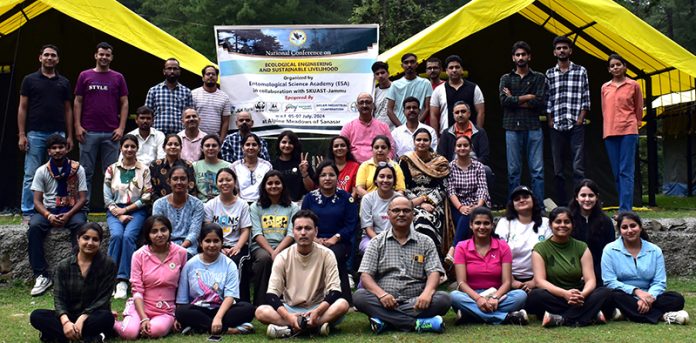Excelsior Correspondent
SANASAR, July 7: The Entomological Science Academy (ESA), collaborated with SKUAST-Jammu host a three-day National Conference on Ecological Engineering and Sustainable Livelihood at Sanasar from July 5 to 7.
This unique event focused on the pest issues threatening the livelihood security of hill farmers in hill agriculture.
With increasing pest problems impacting bio-resources like anardana, wild honey, wild mushrooms, and herbal commodities, the conference brought together 62 delegates from across India, including states such as Arunachal Pradesh, Uttar Pradesh, Rajasthan, Gujarat, Haryana, Himachal Pradesh, Karnataka, Andhra Pradesh, Madhya Pradesh and Jharkhand.
Participants included scientists and research scholars who discussed strategies and recommendations to secure sustainable livelihoods for hill farmers.
The conference featured eight technical sessions with eleven lead papers presented by prominent agricultural scientists from ICAR and SKUAST-Jammu.
Additionally, delegates delivered over 29 oral and 32 poster presentations.
Organized under the guidance of Prof B N Tripathi, Vice-Chancellor of SKUAST-Jammu, the conference emphasized open debate on challenges and solutions.
In his welcome address, Dr R K Gupta, President of ESA, outlined the conference themes, including Hill Farming and Sustainable Livelihood, Agrochemicals, IPM and IDM, Productive Insects and Entrepreneurship for Livelihood, Pollination Crisis and Ecosystem Services, Apitourism and Apitherapy, Bioinspiration from Insects for Sustainable Life, Insect Conservation and Apocalypse, and Ecology and Climate Smart Agriculture.
Dr Poonam Jasrotia, ADG, Plant Protection, ICAR, inaugurated the conference virtually.
She highlighted the potential of ecological engineering to revolutionize insect pest management and ensure sustainable livelihoods for agricultural communities.
Integrating ecological principles with engineering solutions can harmonize human activities with natural ecosystems, enhancing crucial pest regulation services.
The conference concluded with recommendations for each theme, which will be forwarded to policymakers for future planning.
Awards for the best poster and oral presentations were distributed, and the valedictory function ended with a vote of thanks by the organizing secretary.


